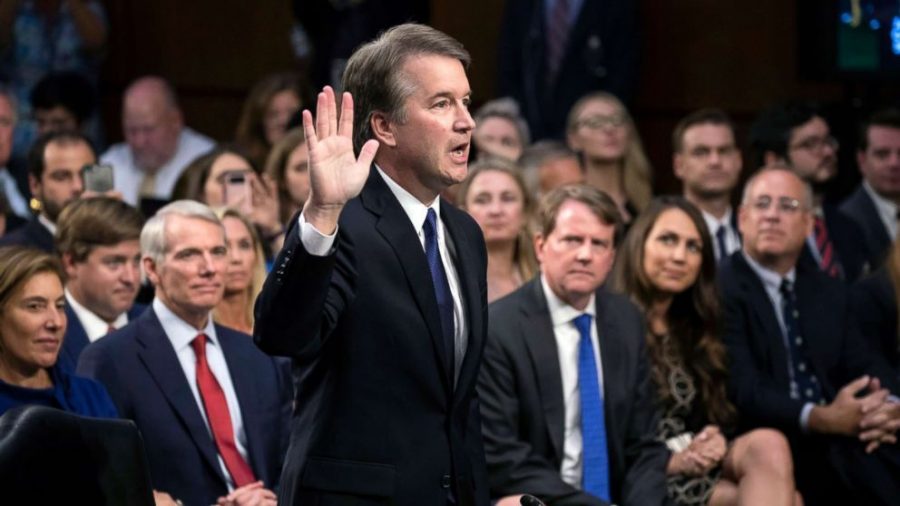He Said – She Said: Gridlock on Kavanaugh Nomination
September 27, 2018
A seemingly surefire nomination of Brett Kavanaugh for President Trump’s second Supreme Court Appointment has become a truculent bipartisan war over which side can point the most fingers. What started as a single sexual allegation has spiraled into a controversial circus that has been dominating the news headlines for the past week. Within the past five days, more and more women have come forward with accusations of sexual misconduct (the current total is five), potentially diminishing Kavanaugh’s chances of becoming the 114th Supreme Court Justice. Given the Republican Majority in the Senate, Kavanaugh’s nomination was almost guaranteed. A national uprising and the slew of allegations have the potential to change that, but an overwhelming Republican majority is unlikely to abandon Kavanaugh in their support. In wake of the #MeToo campaign, women throughout the country are protesting adamantly against Kavanaugh’s confirmation. Students at Yale, Kavanaugh’s alma mater, protested in silence this past week. Teens across the nation are wondering why adults seem so ready to disregard possible sexual abuse. In spite of the political bias, the American citizens agree that Supreme Court Justices are expected to be the most morally upstanding people. These elite justices often have to rule on issues that intimately affect others, which in turn can affect the entire nation. Therefore, it is expected by all Americans that a Justice who rules on such paramount matters should not have previous legal and moral indiscretions. Regardless of the validity of these accusations, should a person who has been accused of sexual abuse on three occasions still be considered to serve on the nation’s highest court?
Certainly not according to Christine Blasey Ford, a statistics professor at Palo Alto University in California, who recently came forward accusing Kavanaugh of sexually assaulting her more than three decades ago. This allegation alone threatened the certainty of Kavanaugh’s nomination. However, soon after it’s publicization, the accusation was not alone. As of Sunday, September 23rd, Deborah Ramirez shared sexual allegations against Kavanaugh, and yet another woman came forward on Wednesday, September 26th. President Trump refers to these accusations as “totally political” as this seemingly simple appointment has turned into another full on bipartisan circus. Ford’s lawyers will be testifying today, September 27th, which will immediately influence Kavanaugh’s likelihood of landing a seat in the Supreme Court. It is impossible to ignore these sexual allegations, and whether or not they are true, Kavanaugh will have to struggle his way free from this net of “Democratic conspiracy” (as described by President Trump).
In 1982, when this alleged event occured, Brett Kavanaugh was growing up in the affluent world of Washington DC prep schools. Both Kavanaugh and Ford had attended private schools in the suburban DC area, and both had supposedly gone to the same party on that fateful night in 1982. The events that transpired on that night are described within a letter Ford wrote to Democratic Senator of California, Dianne Feinstein. The letter remained anonymous and unknown to the public until early September, when the letter became publicized, and later Ford came forward to tell her story:
Brett Kavanaugh physically and sexually assaulted me during high school… Kavanaugh physically pushed me into a bedroom as I was headed for a bathroom up a short stair well from the living room. They locked the door… Kavanaugh tried to disrobe me in [his] highly inebriated state. With Kavanaugh’s hand over my mouth I fear[ed] he may inadvertently kill me… After a few attempts to get away, I was able to… get up and run across to a hallway bathroom.
This letter further polarized the political climate surrounding the Supreme Court nomination. With Ford’s indictment alone, Capitol Hill took a step back from the immediate certainty of Kavanaugh’s nomination. Republicans were irritated with what they perceive as a liberal smear meant to delay or inhibit the Senate vote. Democrats, on the other hand, were disturbed by the situation. They questioned how a man who could have committed such vulgar acts in his past was almost confirmed to determine precedent applying to the entire country for the next generation. However, unbeknownst to all, Kavanaugh’s road to the Supreme Court had yet another debilitating delay: Deborah Ramirez.
Ramirez was a fellow student at Yale with Kavanaugh. The two were at an evening party along with several other students; there was alcohol. Sound familiar? As she recalls, the students were playing a drinking game and Ramirez was quickly intoxicated. Shortly thereafter, a male student exposed himself to her: “I remember a penis being in front of my face” Ramirez stated. She remembers Kavanaugh pulling up his pants, “Brett was laughing.” She then recalls: “Somebody yelled down the hall, ‘Brett Kavanaugh just put his penis in Debbie’s face’…It was his full name. I don’t think it was just ‘Brett.” However, Ramirez has also admits that if she were ever to present her story to the F.B.I or the Senate, she fears her story would immediately dismissed due to her intoxicated condition at the time of the alleged incident.
Less than an hour after Ramirez’s story had become public, Kavanaugh issued a statement:
This alleged event from 35 years ago did not happen… This is a smear, plain and simple. I look forward to testifying on Thursday about the truth, and defending my good name–and the reputation for character and integrity I have spent a lifetime building–against these last-minute allegations.
As expected, Republicans within the White House remain firmly behind Kavanaugh through the avalanche that has been this nomination. Kerri Kupec, White House spokesperson, stated that “this 35-year-old, uncorroborated claim is the latest in a coordinated smear campaign by the Democrats designed to tear down a good man… The White House stands firmly behind Judge Kavanaugh.” Trump also portrays his unwavering support of Kavanaugh, referring to him as “one of the finest human beings you will ever have the privilege of knowing” at a September rally in Las Vegas. Once again, the partisan divide only furthers. Democrats call for attention to be drawn towards Kavanaugh’s past, while Republicans believe that Kavanaugh “is under assault by radical left wing politicians who… just want to destroy and delay.”
However, amidst the fiery partisan blame game, yet another woman came forward accusing Kavanaugh of sexual assault. This time, the accuser was Julie Swetnick, another suburban Georgetown native and peer of Kavanaugh’s in the 1980s. She claimed to have witnessed Kavanaugh lining up outside a bedroom where “numerous boys [were] waiting for their turn with a girl inside the room.” Swetnick continued to state that at one of these parties she was raped, and believed she had been drugged prior. The governmental responses to Swetnick’s claims are identical to the those on both Ford’s and Ramirez’s allegations. Trump attacked Ms. Swetnick’s lawyer, Michael Avenatti, claiming that he “was a third rate lawyer who is good at making false accusations.” The white house had a very similar response, describing Swetnick’s accusations as “ridiculous and from the Twilight Zone.” As predicted, Kavanaugh’s stolid response was simply “this never happened.” Regardless of the accumulating allegations, with both Kavanaugh’s tenacious denial and Ford’s plausible accusations, the decision ultimately falls into the hands of the Senate judiciary committee who will be questioning Dr. Blasey and Kavanaugh.
Within this hearing, Dr. Blasey is set to appear before a 21-person Senate committee. The trial cannot come fast enough for some Republicans in the Senate, who are impatient to land Kavanaugh in the court before midterm elections. Other conservative senators, want to string out the confirmation, as it will cause the Republican voters to support their reelection, in order to confirm Kavanaugh’s seat. If after midterms, Democratic senators outnumber Republicans, Kavanaugh’s will nomination would surely be denied as payback for the Republicans maneuver to deny President Obama’s nominee, Merrick Garland, in the final months of Obama’s presidency. If after the hearing senators from both sides of the aisle interpret these sources as credible and call for additional witnesses, this nomination could fail. It will take just two Republican senators to vote against his appointment . Chad Pergram, of Capitol Hill Senior Produce, predicts this to be the biggest hearing on Capitol Hill in a generation. “The optics are bad,” Pergram states, “if they don’t have the votes, you can’t do anything”.
The drama surrounding Kavanaugh’s nomination has extended far beyond the political world and has prompted many cultural responses throughout the nation. Occurring immediately after the height of the #MeToo movement, this hearing is becoming a national spectacle. On Monday, September 24th, over 100 protesters, portraying their unanimity for Ford’s accusation, were arrested in Washington after marching in front of the Supreme Court and inside Senate office buildings. However, these people were not alone, but instead were part of a series of national protests in support of Ford. In response to these demonstrations, Kavanaugh vowed that he would not withdraw from the nomination process. In New Hampshire, at Yale Law School, Kavanaugh’s alma mater, students wore all black and staged a silent protest. Significantly, these students stood in the exact hallways that Kavanaugh walked thirty years prior. Most Republicans, on the other hand, deny that these allegations hold any truth. Senator Richard Burr of North Carolina stated that “immediately following the conclusion of Thursday’s hearing, the Senate Judiciary Committee should vote”. As per usual, this national debacle has served to further darken the partisan lines that divide this country both politically and culturally.
However, the impact did not fail to reach the younger generation. If anything, current high schoolers across America have the greatest perspective on these accusations, living with a teenage perspective, similar to Kavanaugh’s during his years of allegedly committing abuse. The New York Times published an article on September 21st, citing many teenagers on their thoughts about the Brett Kavanaugh allegations. Some believe he should be held accountable, “because you’re definitely supposed to know right from wrong by my age” commented Leyla Fern King, 15 year old high schooler from St. Louis, Missouri. Maycee Wieczorek, 17 year old from Rapid City, South Dakota, stresses some concern that adults are not recognizing the gravity of Kavanaugh’s teenage character, if the allegations are true; “For me and my friends, his past is our now… Boys will learn that what you do in high school won’t affect your future at all, so go do the damage you need to do now”. Amy Zhou, a 17 year old high school senior from Arizona commented with a similar note, “We need to send a message that people should respect men and women… Kavanaugh’s going to be upholding the supreme law of the land, so obviously he’s supposed to embody that principle.” The High Schoolers interviewed by the New York Times had something to say, so I decided to take this question to the halls of Radnor: Do you believe that what Brett Kavanaugh may or may not have done in high school should influence whether or not he is confirmed to the Supreme Court, a lifetime position that he will likely hold for the next 30 years?
Many students seemed to come to the same general consensus: Yes, these allegations should influence his eligibility for the supreme court. Some cite his morals as cause for concern, especially when it may come to Supreme Court cases dealing with women’s rights or sexual abuse.
“If he were to be on the supreme court, he would never be able to write anything regarding sexual assault. Otherwise the public would not trust the judgment of the Court,” declared sophomore Grace South. If Kavanaugh is appointed, “the integrity of the Court will have been weakened” South continues.
Others also comment on the importance of maintaining the Supreme Court’s Honor, which Kavanaugh’s nomination would only deteriorate. Supreme Court Justices “represent adherence to the constitution and the virtue of the American identity,” Junior Estelle Atkinson states, “Kavanaugh may have been a teenager at the time… but a teenager is not pre-moral.”
Sophomore Audrey Margolis comments on the lesson teenagers may learn if Kavanaugh is given the benefit of the doubt. Kavanaugh’s potential nomination is “defining America’s views on sexism,” states Margolis. “Men should be taught at a young age that their actions now will influence them later,” continues Margolis, emphasizing the importance of education, not just when it comes to drugs, but also about the necessity of consent.
Many believe that these allegations should influence his nomination if they hold true: “if he is an abuser, he shouldn’t be admitted into the court,” states sophomore Ben Adams. Altogether, those in student body who are aware of the allegations seem concerned about his possible nomination and his bias in influential cases.
So, What comes next? Five weeks still remain until the midterm elections, meaning that if the committee does not want to continue Kavanaugh’s investigation, they could vote as soon as this Friday. However, the full floor vote would not occur until later. On the other hand, if any senators wish to further question Kavanaugh, both votes would be delayed. While very unlikely, Kavanaugh would only consider dropping out of the nomination altogether if some Republican senators pushed for further questioning, or were doubtful of his innocence. As with the importance Chad Bergman placed on senate voting, Kavanaugh’s successful nomination rests solely on the cooperation of all Republican senators. On the other side of the political spectrum, if the Democrats are able to elongate this spectacle even further, until midterms, they should attempt to sculpt these allegations into a persuasive case with suburban female voters. Nevertheless, it all comes down to today hearing. The question remains, if these allegations hold some truth, should a man have to suffer for crimes committed more than three decades ago? Or, in spite of whatever the truth may be, should a man who may have committed acts of sexual misconduct be allowed to rule as a Supreme Court justice, ruling upon American morals? Regardless of truth or faux, any person must be scrutinized before being appointed to such a prominent role of American government.







